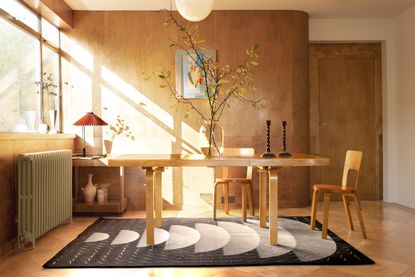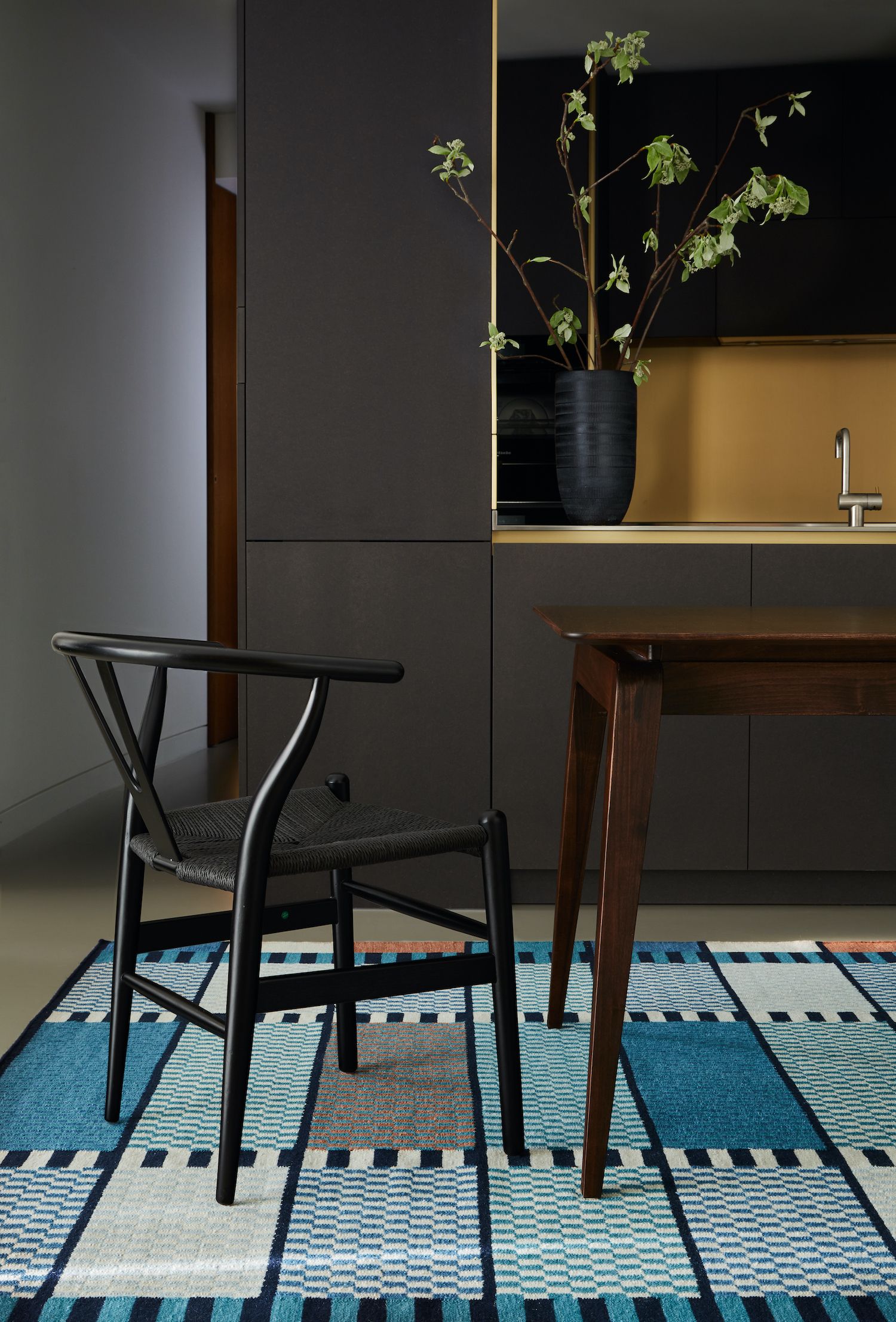How to choose the right dining room rug - the finishing touch you didn't know you needed but that changes everything
The right dining room rug can draw people together and create the perfect ambience. Learn how to find 'the one' with these 10 expert tips

An area rug might not be the first thing that comes to mind when furnishing your dining room, but it has the power to transform it. “A well chosen rug under a dining table frames the whole dining experience, it swaddles guests into a focused space to share a meal together,” says Dylan O’Shea, Co-Founder of the stellar rug makers A Rum Fellow.
However, with the inevitability of spills and heavy wear in this room, finding the right area rug can be tricky. “If you have carpet, then just stick with it, but if you have a hard floor — either wood or concrete, definitely consider a rug,” says Simon Goff, Founder and Director of the wonderful rug design company Floor Story. “Without an area rug dining rooms can look and feel cold and unfinished. I feel that way about most rooms… Rugs make a room!”
How to choose the right dining room rug
The best places to shop online for area rugs

It was hard to choose just one area rug from affordable emporium Society6. Graphic and colorful to neutral and calm, there is a huge choice here.

Target's rugs tend towards neutral colors which may seem scary for a dining room where food gets dropped. But their affordability is huge a plus point.

Such a beautiful offering at Lulu and Georgia, from geometrics to abstract shapes. A real trove of brilliant design which makes for a relaxed dining room.
1. Think about how you use the space

Dining rooms aren’t just for eating: they can also be spaces to work or unwind. Make sure you’re clear about how you use your space before choosing a dining room rug. “In open plan living, rugs are the most wonderful and simple way to zone larger spaces and create inviting areas to dine, lounge, or play,” says Dylan O’Shea from A Rum Fellow.
Frida Ramstedt, interior designer and author of The Interior Design Handbook agrees. “A big area rug can accentuate different areas and create zones or ‘rooms in the room’, working as a solid frame to anchor a large group of furniture,” she says.
Current rug trends center around zoning, a trick which can be used perfectly here.
2. Figure out your proportions

Proportions are essential when choosing a rug for any room. “You need to be careful with proportions in order to get the rug mathematics right,” says Frida Ramstedt. “You do not want an area rug that is too small, as it might look like a little postal stamp compared to a large dining table and chairs. However you do not want to create the feeling that your rug completely eats the room (or the floor).”
When it comes to how to design a dining room, she continues: “Start with measuring the size of the furniture and look for rugs that are bigger than that. If there is enough space in the room, it usually looks good if you place the entire furniture group on the carpet. A good rule of thumb to remember is that the rug underneath a table should be at least 24 inches wider than the table top — otherwise the chair might start to wiggle (if two front legs are on the rug and the two back legs are not) or get tangled in the fabric.”
Robert Wright, Co-Founder of Beni Rugs, adds that this means your rug should be bigger than your dining table and chairs even when your guests are seated. “This helps to truly define the space, and ensure that there are no uneven surfaces,” he says. “By outlining the area where your table and chairs live, you can create a cozy, comfortable dining area. More comfortable guests = more enjoyable dinner conversations.”
3. Dial the energy of your dining room up or down

Think about the current vibe of your space — is there a lot of color on the dining room walls, or is it rather one-note? “Depending on your interior style, your dining room rug can either ground and simplify, or liven up your room,” says Robert Wright from Beni Rugs. “Choose a simple, elegant shade like sage green to tone down a busier room. Meanwhile, a bolder stripe can be the personality in a mostly tonal space.”
“A statement rug adds drama — there is always something interesting to look at and talk about,” says Dylan O’Shea from A Rum Fellow. “Colorful patterned designs on rugs work well in dining rooms, especially as pattern is good at hiding any spills.”
If you’re looking to amp up the coziness of your room, a rug can also solve problems with sound. “Rugs are great if you need to get rid of annoying echoes or get a better acoustic in newly built houses or open-plan spaces,” says Frida Ramstedt.
4. Set the tone of your scheme

Maybe you haven’t started furnishing your space yet, or are giving it a complete makeover. If this is the case, an area rug can inspire the rest of your dining room color scheme. “Due to its scale and prominence, a rug is a powerful statement,” says Robert Wright. “Oftentimes, it provides the background (in terms of color or pattern) to which a room's elements such as furniture and paint choices are matched. The rug tends to set the tone around which a room is built.”
Dylan O’Shea agrees: “It’s an opportunity to curate the narrative of your dining room, choose colors and patterns that reflect the ambiance you wish to create. Whether you want to create a cozy nook, or a formal luxury dining room, a rug will set the tone for your dinner party.”
5. Avoid a single, pale color

As with current dining table trends, when it comes to color, it's best to think practically. “There are a lot of ways choosing a rug can go wrong! Mostly with excessive optimism,” says Phoebe Sung, Co-Founder of design brand Cold Picnic.
“The perfect rug for under your dining room table will never be a pale cream. You don’t want to be the person glaring at guests as they reach for the salsa. The ideal color or design won’t broadcast past mishaps (something with an all-over pattern or in a medium to medium-dark color). You may have to remind yourself of this if you get seduced by an impractical rug.”
6. Choose a repetitive pattern

It may sound obvious, but it can be easy to forget that unlike dining room wallpaper, only a limited portion of your dining room rug will be on show. “As much of the rug will be covered by the table and chairs, we tend to recommend solid colors, or else repetitive patterns, such as stripes or repeated dots for a dining room rug,” says Robert Wright.
Choosing a rug with an irregular pattern isn’t necessarily a poor choice, but it will require more thought. Frida Ramstedt explains: “If you are looking for a rug with Eastern-inspired patterns, make sure the medallion is not covered completely or creating a feeling that the table and chairs are off center.”
7. Be mindful of how furniture will move

Unlike a living room rug, a dining room rug has to withstand furniture being regularly shuffled around on top of it. “Our most popular dining room rugs tend to be our flat woven designs,” says Robert Wright. “They have a lower pile, which means chairs can move more easily across them, and inevitable spills are also easier to deal with.”
“Get a dining room rug installed over an underlay that grips the rug to prevent it from moving with the chairs,” advises Simon Goff from Floor Story. “I would go for a low pile, a flatweave or maybe a low pile hand knotted. Old vintage pieces also work well and they have a very low pile. And consider what type of legs the chairs have: very thin pointed legs will leave indentations in a rug with a pile.”
8. Make a beeline for hemp, jute or wool

Certain materials are particularly well suited to stain-prone zones. “We see a lot of hemp rugs under tables, which is probably the most practical choice,” says Cold Picnic’s Phoebe Sung. “Hemp and jute rugs look casual and effortless while also pulling the space together. They’re also the most forgiving when it comes to spills and stains.”
Wool is another top-performer when it comes to dining room rugs. “Wool rugs are beautiful, plus the wool has a natural protective coating which provides stain resilient properties,” says Dylan O’Shea. “Our flatweaves are easy to care for and hard wearing, but also tactile and comforting underfoot.”
9. Take note of care instructions

Just like that dry-clean-only sweater you never bother wearing, you don’t want to end up resenting a rug that’s too high-maintenance.
“I’d recommend looking into care instructions prior to purchasing,” says Cold Picnic's Phoebe Sung. “Most hand tufted rugs require very frequent vacuuming which could be a pain when your rug is covered by chairs and a table. I’d stay away from rugs with a deep or shaggy pile too, as food can get stuck.”
10. Choose something that makes you happy

Whether you have a small dining room or a big space, there are many practical considerations to keep in mind when choosing a rug. The most important thing is to invest in one that brings you joy.
“We have a bamboo silk rug under our dining room table," says Phoebe Sung. "They are said to be very delicate. The more use they get, the more they lose their softness (it’s almost an unrealistic amount of softness to cling to to be honest!), and they’re supposedly destroyed by water. But we happen to like the way the yarn looks more like crushed velvet as it becomes more lived-in, and the sheen actually helps to disguise stains. A rug should make you happy. Or why bother?”
Be The First To Know
The Livingetc newsletter is your shortcut to the now and the next in home design. Subscribe today to receive a stunning free 200-page book of the best homes from around the world.
Kate Hollowood is a freelance journalist who writes about a range of topics for Marie Claire UK, from current affairs to features on health, careers and relationships. She is a regular contributor to Livingetc, specializing in reporting on American designers and global interiors trends. Based in London, Kate has also written for titles like the i paper, Refinery29, Cosmopolitan and It’s Nice That.
-
 The 12 Best Table Lamps for Reading —I'm a Certified Bookworm (and Shopping Expert)
The 12 Best Table Lamps for Reading —I'm a Certified Bookworm (and Shopping Expert)When it comes to table lamps for reading, I don't mess around. If you're the same, this edit is for YOU (and your books, or course — and good recommendations?)
By Brigid Kennedy Published
-
 "It's Scandi Meets Californian-Cool" — The New Anthro Collab With Katie Hodges Hits Just the Right Style Note
"It's Scandi Meets Californian-Cool" — The New Anthro Collab With Katie Hodges Hits Just the Right Style NoteThe LA-based interior designer merges coastal cool with Scandinavian simplicity for a delightfully lived-in collection of elevated home furnishings
By Julia Demer Published

